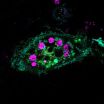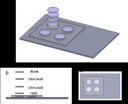(Press-News.org) ANN ARBOR, Mich. -- The number of younger men diagnosed with prostate cancer has increased nearly 6-fold in the last 20 years, and the disease is more likely to be aggressive in these younger men, according to a new analysis from researchers at the University of Michigan Comprehensive Cancer Center.
Typically, prostate cancer occurs more frequently as men age into their 70s or 80s. Many prostate cancers are slow-growing and many older men diagnosed with early stage prostate cancer will end up dying from causes other than prostate cancer.
But, the researchers found, when prostate cancer strikes at a younger age, it's likely because the tumor is growing quickly.
"Early onset prostate cancer tends to be aggressive, striking down men in the prime of their life. These fast-growing tumors in young men might be entirely missed by screening because the timeframe is short before they start to show clinical symptoms," says Kathleen A. Cooney, M.D., professor of internal medicine and urology at the University of Michigan.
Peter Rich was 59 when he was diagnosed with stage 4 prostate cancer. His PSA was only 9, but the disease had already spread to his ribs, spine and lymph nodes.
"To think of mortality was devastating. It was like any major loss – shock and numbness," says Rich, who had to retire from his job as a school social worker because of his cancer treatment.
Rich was diagnosed six years ago. Average survival for stage 4 disease is generally less than three years.
"What we both said when we got the diagnosis was, well, that's not acceptable," Rich says of himself and his wife, Carol. "I'm a fighter."
Cooney and Scott Tomlins, M.D., Ph.D., assistant professor of pathology at U-M, are leading a new study supported by the U.S. Department of Defense to look at DNA of both normal and cancerous prostate tissue of men diagnosed with advanced prostate cancer before age 61. They will be looking at whether these younger men are more likely to have inherited genetic mutations. For more information on this study, contact the U-M Cancer AnswerLine at 800-865-1125.
Men with a family history of prostate cancer have a two- to three-times greater chance of being diagnosed with prostate cancer. That risk increases for young men with multiple affected relatives.
Prostate cancer runs in Rich's family. Like Rich, his brother was diagnosed in his 50s, and a cousin and uncle had prostate cancer as well.
The new analysis, which appears in Nature Reviews: Urology, found that men with early onset prostate cancer had more genetic variants than men diagnosed with prostate cancer at a later age. The researchers suggest that genetic counseling or increased surveillance in younger men with a family history of prostate cancer may be warranted.
American men have a 16 percent risk of developing prostate cancer in their lifetime, but only a 3 percent lifetime risk of dying from it. The challenge, Cooney says, is understanding which subset of prostate cancers are most likely to be aggressive and deadly.
"The unexpectedly poor prognosis of advanced stage early onset prostate cancer supports the idea that a new clinical subtype might exist in the subset of men with early onset prostate cancer. This subtype is more aggressive and requires more specialty expertise, including genetic sequencing," Cooney says.
Early Onset Prostate Cancer Statistics
The American Cancer Society estimates 241,740 Americans will be diagnosed with prostate cancer this year; about 10 percent will be early onset disease
INFORMATION:
Additional Authors
Claudia A. Salinas, Alex Tsodikov, Miriam Ishak-Howard, from the University of Michigan Medical School and School of Public Health
Funding
National Cancer Institute grants R01 CA79596, R01 CA136621, P50 CA69568, U01 CA157224
Disclosure
None
Reference
Nature Reviews: Urology, doi:10.1038/nrurol.2014.91
Prostate cancer in young men -- More frequent and more aggressive?
Early onset prostate cancer a newly identified, more aggressive subtype often linked to genetic mutations
2014-07-15
ELSE PRESS RELEASES FROM THIS DATE:
Rollout strategy for diagnostic test in India may impact TB
2014-07-15
Xpert MTB/RIF, a recently implemented tuberculosis (TB) test, has the potential to control the TB epidemic in India, but only if the current, narrow, implementation strategy is replaced by a more ambitious one that is better funded, also includes the private sector, and better referral networks are developed between public and private sectors, according to new research published in this week's PLOS Medicine. The study by David Dowdy, from Johns Hopkins University, United States, and colleagues is a mathematical model that suggests alternative strategies that include engagement ...
Molecular 'eat now' signal makes cells devour dying neighbors
2014-07-15
A team of researchers has devised a Pac-Man-style power pellet that gets normally mild-mannered cells to gobble up their undesirable neighbors. The development may point the way to therapies that enlist patients' own cells to better fend off infection and even cancer, the researchers say.
A description of the work will be published July 15 in the journal Science Signaling.
"Our goal is to build artificial cells programmed to eat up dangerous junk in the body, which could be anything from bacteria to the amyloid-beta plaques that cause Alzheimer's to the body's own ...
Neurons, brain cancer cells require the same little-known protein for long-term survival
2014-07-15
CHAPEL HILL, N.C. – Researchers at the UNC School of Medicine have discovered that the protein PARC/CUL9 helps neurons and brain cancer cells override the biochemical mechanisms that lead to cell death in most other cells. In neurons, long-term survival allows for proper brain function as we age. In brain cancer cells, though, long-term survival contributes to tumor growth and the spread of the disease.
These results, published in the journal Science Signaling, not only identify a previously unknown mechanism used by neurons for their much-needed survival, but show that ...
Rollout strategy is key to battling India's TB epidemic, researchers find
2014-07-15
A new study led by Johns Hopkins Bloomberg School of Public Health researchers suggests that getting patients in India quickly evaluated by the right doctors can be just as effective at curbing tuberculosis (TB) as a new, highly accurate screening test.
While ideally all suspected TB cases would be evaluated with the new test, it is primarily being used only on the highest-risk populations and only in public health clinics, partly because of its cost and the complexity of the nation's health care system. This slows diagnosis of a disease that must be caught early, the ...
New assay to spot fake malaria drugs could save thousands of lives
2014-07-15
CORVALLIS, Ore. – Chemists and students in science and engineering at Oregon State University have created a new type of chemical test, or assay, that's inexpensive, simple, and can tell whether or not one of the primary drugs being used to treat malaria is genuine – an enormous and deadly problem in the developing world.
The World Health Organization has estimated that about 200,000 lives a year may be lost due to the use of counterfeit anti-malarial drugs. When commercialized, the new OSU technology may be able to help address that problem by testing drugs for efficacy ...
3-D nanostructure could benefit nanoelectronics, gas storage
2014-07-15
A three-dimensional porous nanostructure would have a balance of strength, toughness and ability to transfer heat that could benefit nanoelectronics, gas storage and composite materials that perform multiple functions, according to engineers at Rice University.
The researchers made this prediction by using computer simulations to create a series of 3-D prototypes with boron nitride, a chemical compound made of boron and nitrogen atoms. Their findings were published online July 14 in the Journal of Physical Chemistry C.
The 3-D prototypes fuse one-dimensional boron nitride ...
TGen-led study finds likely origin of lung fungus invading Pacific Northwest
2014-07-15
FLAGSTAFF, Ariz. - Cryptococcus gattii, a virulent fungus that has invaded the Pacific Northwest is highly adaptive and warrants global "public health vigilance," according to a study by an international team led by the Translational Genomics Research Institute (TGen).
C. gattii, which likely originated in Brazil, is responsible for dozens of deaths in recent years since it was first found in 1999 on Vancouver Island, British Columbia, Canada, well outside its usual tropical habitats.
"We identified several genes that may make the outbreak strains more capable of surviving ...
Rice nanophotonics experts create powerful molecular sensor
2014-07-15
Nanophotonics experts at Rice University have created a unique sensor that amplifies the optical signature of molecules by about 100 billion times. Newly published tests found the device could accurately identify the composition and structure of individual molecules containing fewer than 20 atoms.
The new imaging method, which is described this week in the journal Nature Communications, uses a form of Raman spectroscopy in combination with an intricate but mass reproducible optical amplifier. Researchers at Rice's Laboratory for Nanophotonics (LANP) said the single-molecule ...
SLU scientists hit 'delete': Removing regions of shape-shifting protein explains how blood clots
2014-07-15
ST. LOUIS – In results recently published in Proceedings of the National Academy of Sciences (PNAS), Saint Louis University scientists have discovered that removal of disordered sections of a protein's structure reveals the molecular mechanism of a key reaction that initiates blood clotting.
Enrico Di Cera, M.D., chair of the Edward A. Doisy department of biochemistry and molecular biology at Saint Louis University, studies thrombin, a key vitamin K-dependent blood-clotting protein, and its inactive precursor prothrombin (or coagulation factor II).
"Prothrombin is essential ...
New skin gel fights breast cancer without blood clot risk
2014-07-15
CHICAGO --- A gel form of tamoxifen applied to the breasts of women with noninvasive breast cancer reduced the growth of cancer cells to the same degree as the drug taken in oral form but with fewer side effects that deter some women from taking it, according to new Northwestern Medicine® research.
Tamoxifen is an oral drug that is used for breast cancer prevention and as therapy for non-invasive breast cancer and invasive cancer.
Because the drug was absorbed through the skin directly into breast tissue, blood levels of the drug were much lower, thus, potentially ...
LAST 30 PRESS RELEASES:
Scientists show how to predict world’s deadly scorpion hotspots
ASU researchers to lead AAAS panel on water insecurity in the United States
ASU professor Anne Stone to present at AAAS Conference in Phoenix on ancient origins of modern disease
Proposals for exploring viruses and skin as the next experimental quantum frontiers share US$30,000 science award
ASU researchers showcase scalable tech solutions for older adults living alone with cognitive decline at AAAS 2026
Scientists identify smooth regional trends in fruit fly survival strategies
Antipathy toward snakes? Your parents likely talked you into that at an early age
Sylvester Cancer Tip Sheet for Feb. 2026
Online exposure to medical misinformation concentrated among older adults
Telehealth improves access to genetic services for adult survivors of childhood cancers
Outdated mortality benchmarks risk missing early signs of famine and delay recognizing mass starvation
Newly discovered bacterium converts carbon dioxide into chemicals using electricity
Flipping and reversing mini-proteins could improve disease treatment
Scientists reveal major hidden source of atmospheric nitrogen pollution in fragile lake basin
Biochar emerges as a powerful tool for soil carbon neutrality and climate mitigation
Tiny cell messengers show big promise for safer protein and gene delivery
AMS releases statement regarding the decision to rescind EPA’s 2009 Endangerment Finding
Parents’ alcohol and drug use influences their children’s consumption, research shows
Modular assembly of chiral nitrogen-bridged rings achieved by palladium-catalyzed diastereoselective and enantioselective cascade cyclization reactions
Promoting civic engagement
AMS Science Preview: Hurricane slowdown, school snow days
Deforestation in the Amazon raises the surface temperature by 3 °C during the dry season
Model more accurately maps the impact of frost on corn crops
How did humans develop sharp vision? Lab-grown retinas show likely answer
Sour grapes? Taste, experience of sour foods depends on individual consumer
At AAAS, professor Krystal Tsosie argues the future of science must be Indigenous-led
From the lab to the living room: Decoding Parkinson’s patients movements in the real world
Research advances in porous materials, as highlighted in the 2025 Nobel Prize in Chemistry
Sally C. Morton, executive vice president of ASU Knowledge Enterprise, presents a bold and practical framework for moving research from discovery to real-world impact
Biochemical parameters in patients with diabetic nephropathy versus individuals with diabetes alone, non-diabetic nephropathy, and healthy controls
[Press-News.org] Prostate cancer in young men -- More frequent and more aggressive?Early onset prostate cancer a newly identified, more aggressive subtype often linked to genetic mutations





